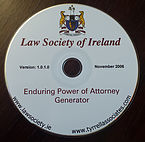Enduring Powers of Attorney
Executing an EPA

The steps outlined below for executing an EPA assume that one engages the services of a solicitor.
Your solicitor can generate the full suite of documents using the EPA Generator
This process will change somewhat with the upcoming commencement of the Assisted Decision Making Act 2015. For further details on the progress of this please follow our blog
Step 1
Make an appointment with your solicitor having ready the following information:
-
Your name and address.
-
Name and address of your attorneys
-
Name and address of deputy attorneys (if applicable)
-
Name and address of your doctor
-
Name and address of notice parties
-
Details of instructions
-
Details of personal care instructions
-
Name of persons that may need to be consulted, if applicable.
If there will be more than one attorney, decide if they are to act jointly/jointly and severally.
The Instrument for creating an Enduring Power of Attorney is defined in legislation under S.I. No. 196 of 1996.
Step 2
Your solicitor will draft the necessary documents and send them to you for review.
Step 3
On receipt you need to:
- Read Part A: Explanatory Information.
-
Sign Part B: Enduring Power of Attorney. Your signature must be witnessed but the witnesses cannot be one of the attorneys or your spouse. Usually the witness will be your solicitor unless he/she is also an attorney.
-
Return the signed document to your solicitor.
Step 4
Solicitor sends copies of Part C to your attorneys for signing.
All signatures must be witnessed but the witness cannot be the donor or other attorney(s).
Alternatively, your solicitor may arrange to have all parties meet in their office on a specific day so that all documents are signed and witnessed together.
Step 5
Part D is completed by the solicitor confirming that they have interviewed you and are satisfied that you understand the effect of creating the Enduring Power and have no reason to believe that this document is being executed by the donor as a result of fraud or undue pressure
Step 6
Make an appointment with your doctor for a medical examination. Part E is completed by your doctor stating in their opinion that at the time the EPA document was executed you had the mental capacity to do so and understand the effect of creating the power. Return the signed statement back to your solicitor.
Step 7
Your solicitor will send by registered post the Notice of execution by donor of enduring power to each notice party.
Step 8
Your solicitor will sign an affidavit confirming that notice parties were served.
Your solicitor usually retains documents but there is no reason why you can’t keep original documents yourself or give them to an attorney for safe keeping. Either way, all attorneys should be informed of their precise location.
You can review the provisions at any time and alter the EPA. Changes mean revoking the original and creating a new one. Similar procedures are involved in revoking and a medical examination is required to confirm that they had the mental capacity of understanding the revocation.
